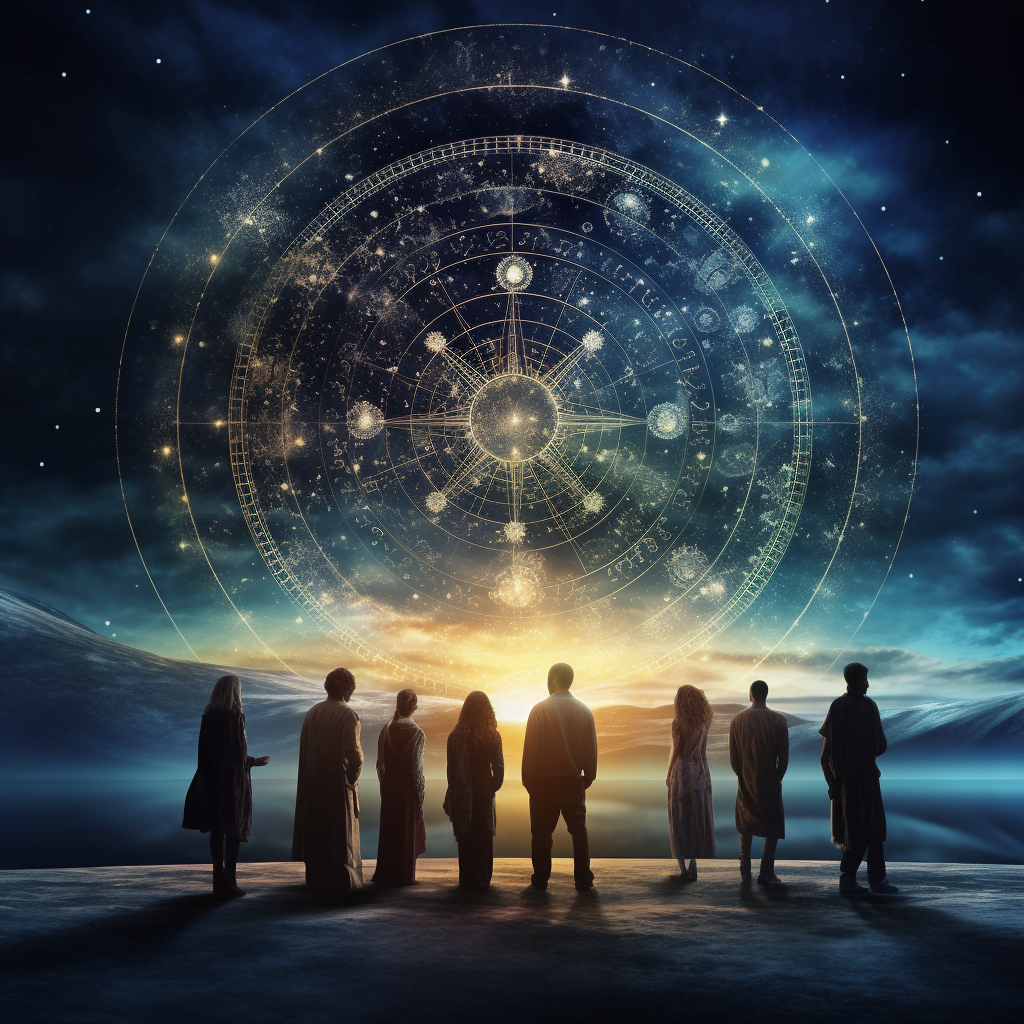As an academic researcher, I am compelled to delve into the intricate tapestry of human curiosity and explore the captivating history of astrology. With its roots tracing back thousands of years, astrology has intrigued and influenced cultures across the globe. This ancient practice, centered around the observation and interpretation of celestial bodies, has captured the imagination of individuals seeking answers to life’s profound questions. From the symbolic importance of zodiac signs to the celestial intricacies of horoscopes, astrology stands as a testament to humanity’s enduring fascination with the stars. But just how long has astrology been around?
Ancient Origins
Astrology, as an ancient belief system, has its roots deeply intertwined with the rich history of various ancient civilizations. Mesopotamian astrology, considered one of the earliest forms of this celestial practice, emerges from the fertile lands between the Tigris and Euphrates rivers. Dating back to the 2nd millennium BCE, Mesopotamian astrology emphasized the connection between celestial movements and earthly events. It served as a means to understand human fates and the influence of celestial bodies on their lives.
Similarly, the ancient Egyptians also had a profound fascination with astrology. The Egyptians attributed great significance to the alignment of celestial bodies and their association with specific deities. Astrology played a vital role in their religious practices and was intricately linked to their understanding of the afterlife. By studying the stars and their movements, the Egyptians sought guidance and cosmic reassurance.
Across the ancient world, Chinese astrology developed alongside these Mesopotamian and Egyptian traditions. Rooted in a profound respect for the natural world, Chinese astrology linked human destinies to the cycles of Yin and Yang, as well as the positioning of the stars, planets, and other celestial elements. It relied on a complex system of twelve animal signs and the interplay of the five elements to construct a comprehensive astrological framework.
Greek Influence
The influence of ancient Greece on astrology cannot be overstated. The Hellenistic period witnessed a significant fusion of Mesopotamian, Egyptian, and Greek astrological practices, leading to the emergence of Hellenistic astrology. This new approach expanded the connection between celestial bodies and human lives, introducing concepts like the zodiac, ascendants, and the twelve houses.
One pivotal figure in the development of astrology during this time was Claudius Ptolemy, a Greek astronomer, mathematician, and astrologer. His work “Tetrabiblos” laid the foundation for astrological thought in the Mediterranean region for centuries to come. Ptolemy’s treatise emphasized the influence of the planets on human behavior and personality traits, providing a systematic framework for astrologers to interpret celestial phenomena.
Middle Ages
During the Middle Ages, astrology experienced a significant influx of knowledge and ideas through the Arab and Persian civilizations. Arabian astrologers eagerly absorbed the wisdom of ancient Mesopotamia and Greece and built upon it with their own advancements in mathematical astrology. By incorporating techniques like astrological forecasting and the importance of the lunar nodes, Arab and Persian astrologers expanded the scope and depth of this practice.
In Medieval Europe, astrology intertwined with various aspects of daily life. It permeated the realms of medicine, agriculture, politics, and even the Church. The belief that celestial bodies held sway over earthly matters was deeply ingrained in European society. Astrologers were consulted for advice on matters of state, while individuals sought astrological guidance in areas such as health, relationships, and agriculture.
Renaissance and Enlightenment
The Renaissance period marked a significant shift in Europe’s intellectual landscape, including astrology. The Copernican Revolution, spearheaded by Nicolaus Copernicus, revolutionized the understanding of the cosmos. With the acceptance of a heliocentric model, traditional astrological beliefs faced challenges as the Earth was no longer considered the center of the universe.
However, astrology did not disappear during this period; rather, it adapted and evolved. In the Renaissance, astrologers embraced new advancements in mathematics and astronomy. The practice of astrology became intertwined with the study of natural philosophy, and scholars like Johannes Kepler sought to refine astrological methods by grounding them in empirical observations.
Modern Astrology
The 19th and 20th centuries saw the emergence of new perspectives on astrology, reflecting the changing cultural and intellectual climate. The Theosophical Society, founded by Helena Blavatsky, introduced esoteric and spiritual elements into astrology. Blavatsky and her followers believed that astrology could serve as a tool for self-discovery and spiritual growth, providing individuals with insights into their souls and life purposes.
Psychological astrology, popularized by Swiss psychiatrist Carl Jung, further expanded the understanding of astrology in the modern world. Jung viewed astrology as a symbolic language that could shed light on the unconscious aspects of the human psyche. By exploring archetypes and symbols present in astrology, individuals could gain deeper insights into their personal development and psychological patterns.
In contemporary times, astrology has retained its popularity and evolved to encompass a wide range of practices and approaches. Astrologers cater to diverse preferences, offering personalized birth chart readings, horoscopes, and compatibility assessments. Contemporary astrology continues to captivate individuals seeking guidance, self-reflection, and a deeper understanding of their place in the universe.
Astrology and the Scientific Community
Despite its enduring popularity, astrology has faced persistent criticism from the scientific community. Scientists argue that astrology lacks a solid empirical basis and relies on generalizations and subjective interpretations. Skeptics point out that no conclusive evidence supports astrology’s claims of predicting future events or personality traits.
However, astrology has found some common ground with psychology. Many psychologists acknowledge that astrology can serve as a valuable tool for self-reflection and personal insight. While they caution against accepting astrology as a scientific discipline, they recognize its potential as a means of introspection and understanding one’s inner world.
Astrology in Pop Culture
Newspaper horoscopes have become ubiquitous in popular culture. These short astrological forecasts, tailored to each zodiac sign, provide a lighthearted glimpse into what the stars have in store for individuals. While they may lack the depth and precision of a comprehensive astrological chart reading, these horoscopes offer a simple and accessible way for individuals to engage with astrology in their daily lives.
Astrology’s influence extends far beyond newspaper columns. It frequently appears in movies, television shows, and novels, where characters consult astrologers or use astrology as a plot device. Astrologers themselves have become media personalities, offering their insights and predictions on various platforms.
With the rise of social media, astrology has found a new home online. Astrologers and astrology enthusiasts share daily horoscopes, zodiac memes, and articles exploring the intricacies of astrological signs and their compatibility. Social media platforms provide a global space for individuals to connect, learn, and exchange thoughts on astrology.
Astrology and Personal Beliefs
Astrology and personal beliefs are deeply intertwined, with individuals interpreting astrological information according to their own worldview and spiritual inclinations. While some approach astrology purely as a psychological tool or entertainment, others attribute spiritual significance to its findings. For these individuals, astrology serves as a means of connecting with something greater, exploring their spiritual identities, and seeking guidance in navigating life’s challenges.
Astrology Practices and Techniques
Birth charts, also known as natal charts, form the cornerstone of astrological practice. Constructed using an individual’s date, time, and place of birth, birth charts map out the positions of celestial bodies at the moment of their birth. This comprehensive snapshot provides astrologers with valuable insights into a person’s personality traits, strengths, weaknesses, and life path.
Astrologers also analyze planetary transits, which refer to the current movements of planets across the zodiac. These transits are believed to influence various aspects of life, ranging from emotions and relationships to career and personal growth. By tracking planetary transits, astrologers can offer guidance on navigating specific periods of time and harnessing the energies at play.
Astrological aspects, such as conjunctions, squares, trines, and oppositions, analyze the relationships between celestial bodies in a birth chart or during planetary transits. These aspects, defined by the geometric angles formed between planets, have specific symbolic meanings and provide astrologers with valuable insights into the dynamics at play in an individual’s life.
Astrology and Global Cultures
Astrology is not confined to Western societies; it has a prominent place in various global cultures. In India, astrology, known as Jyotish, has been practiced for centuries. Jyotish incorporates traditions of Vedic astrology and Hindu cosmology, providing individuals with guidance on important life decisions, auspicious timings, and astrological remedies.
Similarly, astrology has long been entwined with Japanese culture. The Japanese zodiac utilizes animal signs, much like the Chinese zodiac, to determine an individual’s characteristics and compatibility. Astrology in Japan serves as a tool for self-reflection, offering individuals insights into their strengths, weaknesses, and compatibility with others.
Across the African continent, astrology takes different forms, reflecting the diverse cultural practices and belief systems. Astrology in Africa often combines elements of traditional indigenous beliefs, divination systems, and the influences of colonial powers. From West African Ifá divination to Zulu astrology, these practices provide individuals with guidance, healing, and an understanding of their place within their respective communities.
In conclusion, astrology has a storied history that spans ancient civilizations, underwent transformations during pivotal moments in human intellectual development, and continues to evolve in the modern world. Whether one views astrology through a scientific lens, a psychological framework, or a spiritual perspective, it remains a powerful means of exploring the complex interplay between the celestial and human realms. From ancient Mesopotamia to the modern digital age, astrology continues to captivate individuals worldwide, offering insights into their lives, relationships, and personal growth.


